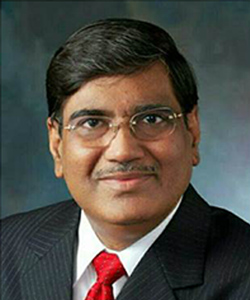Dr Smarta is the Founder and Managing Director of Interlink, a Business performance consulting firm operating in the Pharmaceuticals, Nutraceutical and Wellness domain for over 35 years. As one of the pioneers and thought leaders in the field of Pharma, Nutra and Wellness, he has designed management agendas for profitable growth, expansion, launched new concepts, ideas and projects, helping over 300 clients with effective and sustainable solutions to improve business performance. Dr Smarta’s forte lies in his deep understanding of the domain, ability to drive innovation and deliver customized solutions – be they start-ups, national or multinational clients. In a conversation with CXO Outlook, Dr Smarta shares his views on India’s nutraceutical industry scenario, trends in the nutraceutical market, and much more.
As one of the pioneers and thought leaders in Pharma, Nutra and Wellness, what are your views on the nutraceutical industry scenario in India?
The Indian Nutraceutical Industry currently accounts for 2-3 per cent of the market globally and is expected to continue to grow to reach $10 billion in the next two years. The dominant segment in the industry is dietary supplements that today accounts for $3.16 billion of sales, with functional foods and beverages accounting for $1.82 billion.
Rising health consciousness, the influence of Indian Traditional Medicine (Ayurveda), increasing incidences of lifestyle diseases such as diabetes and obesity, usage of vitamins and minerals to stay healthy and high demographic dividend are key growth drivers for the industry. The pandemic has given a further fillip to the industry, with the focus of consumers now shifting to the prevention of diseases and fitness, resulting in a surge in demand for immune boosters.
How has the pandemic generated exceptional opportunities for the Indian Nutraceutical Industry?
As mentioned earlier, the pandemic has resulted in a mindset shift amongst consumers, with the focus now on healthy living, preventive healthcare and fitness. This has resulted in a manifold increase in the consumption of nutraceutical products as well as dietary supplements. We are seeing a steady rise in demand for these products in line with the growing awareness and knowledge of consumers. Ingredients such as Vitamin D, Vitamin C and Zinc are on the top of the list. Even healthy snacks like protein bread have seen a sharp rise in demand. Several ingredients and herbs are being used today for not only their immune-boosting properties, but also for preventing the side-effects of medicines. Demand for products like Curcumin, Selenium and Probiotics have been growing along with other ingredients like Asthaxanthin, Polyphenols from pomegranate, Glutathione and extracts of Indian spices like Ginger and Garlic that are considered to be important ingredients to build immunity. Being a biodiverse country with a large agricultural base and deep understanding of traditional medicine (Ayurveda) usage, India is today one of the leading exporters of herbs and medicinal plants to other countries.
Tell us about the global trends in nutraceutical market? What are their key drivers? How is India poised to strengthen and increase the foothold in the global nutraceutical market?
The demand for nutraceuticals can be gauged from the fact that the market for Nutraceutical products globally today stands at $387 billion and has been registering a CAGR of 8 percent over the last five years. USA, Japan and Europe together account for more than 90 percent of the market with the USA alone constituting 60 percent of it.
A preference for organics, growing awareness and perceived risk of lifestyle diseases such as diabetes, heart disease, cancer, obesity; a rapidly aging population and healthier lifestyle changes have been key drivers of the market.
Developed countries such as the USA have been consuming India pharma generics for years now, earning the country the sobriquet of being the pharmacy to the world and the trust factor strong as ever. With Indian nutraceuticals making an entry into those developed markets and that too at prices equivalent to USA products, we are likely to see a strong acceptance and traction for Indian Nutraceutical products and dietary supplements. India can similarly gain a strong foothold in other international markets through the disease-based nutraceutical products route/clinical nutrition products route.
What are the unique advantages that India has in the nutraceutical segment? What are the challenges hampering its growth?
I believe India’s rich heritage of herbal, Ayurvedic medicines and spices is its biggest advantage that holds the country’s nutraceutical industry in good stead and in a unique position for expansion and growth. The herbal segment is expected to constitute 30 percent of the dietary supplements market in India and is expected to grow at a CAGR of 20 percent from 2015 to 2023. The second element is its rich biodiversity, robust agricultural research infrastructure and abundant availability of nutraceutical ingredients that has seen it become a preferred supplier to the world for ingredients such as highly bioavailable curcumin, Ashwagandha, fibers like Fenugreek, natural Astaxanthin, black garlic, etc. It also presents a fantastic opportunity in the area of phytopharmaceuticals that has been recognized for its role in preventive as well as curative effects for lifestyle diseases.
The third element is its manufacturing forte. India has already emerged as a global pharma powerhouse due to its ability to produce high-quality and low-cost generic drugs. Nutraceutical manufacturing uses many of the same technologies as the pharma industry. Low cost, high quality manufacturing can help India emerge as a global leader in the finished Nutraceutical product space as well. As the second most populated country in the world, the country has seen a huge traction for nutraceutical products in urban areas with growing disposable income, prevalence of lifestyle diseases, greater focus on preventive healthcare, heightened awareness due to social media and lower food quality. However, beyond the urban segment, the rural parts of the country represent a huge untapped opportunity for nutraceutical sales. The Government focus on AYUSH (The Ministry of Ayurveda, Yoga & Naturopathy, Unani, Siddha and Homoeopathy) and integrated medicine platforms whereby Nutrition, Nutraceuticals, Ayurveda and other alternative medicines have chances to flourish have been another shot in the arm for the industry.
While it is Advantage India in the nutraceuticals space, challenges exist:
- Changing Regulatory Climate:
Due to the growing nature of Nutraceutical industry, a lot of regulatory changes are being effected right from product definitions, approvals, health claims and manufacturing standards.
- The Legal and Regulatory Framework:
In the case of a legal framework, corporate law and necessary steps to create an entity in India has been elaborated in FSSA (Food Safety and Standards Act of India) Section 22, whereby compliance to operate in India is mandatory.
- Look-alike Products:
Look-alike products are a serious problem for the Indian Nutraceutical market, which confuses consumers on how to differentiate between the real and fake.
- Cost Effective Pricing:
The Indian market is a price sensitive market. While the demand for nutraceuticals is expected to rise considerably, the high prices of Nutraceuticals limit their adoption in the Indian market. Also, for India entry, import tariffs need to be understood for managing right pricing of products.
- Negligible Government Health Security:
In India, the government-funded healthcare is very limited and major expenditure is incurred by individuals through out-of-pocket expenses. Hence, the scope of insurance is huge.
- Tailoring Products to Domestic Tastes and Preferences:
India is a country where there a Unity in Diversity. The preferences include vegetarianism, Halal or Hindu dietary practices and traditional remedies reflecting social and cultural diversity. Hence, the demand for product may vary state wise and even religion wise.
You have written five books on Nutraceuticals. Tell us, how can we utilize nutraceuticals better in the continuum of care? What are the gaps that needs to be mitigated?
Continuum of care starts with health issues and complete care is usually given by keeping wellness of the patient in mind. Mitigating or managing a specific disease is essential but not sufficient criteria to provide wellness. As a result, it is essential to combine the benefits of modern medicine treatment with Nutraceutical or dietary supplements to simultaneously boost immunity and create a complete care package for the patient.
The concept I would like to see take centerstage here is ‘Pharma-Nutrition’. This concept is likely to come into its own soon as it encompasses the entire spectrum from prevention to cure to rehabilitation and wellness of each individual. Healthcare providers will have to think in a ‘pathy-agnostic’ way and utilize modern medicines along with Dietary Supplements and even Herbal medicines to ensure wellness and complete cure.
What is the role of technology in this segment? How can technology accelerate productivity and improve quality?
Advancements in technology have been a boon to this segment. One of the roles played by technology is to ensure safety, efficacy and effectiveness of products. For example, in manufacturing and R&D the use of nanotechnology has accelerated the bioavailability of active ingredients. Nanocurcumin would be the best case in point of this. Nanocurcumin acts as a base for many ingredients for faster delivery in the body as well for absorption. If we look at the supply chain, then block-chain technology has been a milestone where each of the ingredients and products can be tracked and traced by the consumers. New forms of Nutraceutical products such as gummies, sachets, effervescent etc. are showing consumer acceptance for the innovation.
Similarly, Artificial Intelligence (AI) and Machine Learning used at multiples levels of clinical trials have improved outcomes and reduced production time.
What are the biggest lessons that India’s nutraceutical players can learn from the pharma sector?
Two of the key lessons would be:
- Availability of clinically proven safety and efficacy data of products to ensure life of consumer is protected: To keep consumers healthy, an ethical approach should be adopted in managing the entire value chain to maintain the health of consumers. Each section of value chain starting from sourcing of ingredients, manufacturing as well as marketing and communication should be backed with evidence of safety and efficacy
- State-of-the-art R&D as well as accreditation by relevant authorities to ensure due process is followed and adherence to systems of manufacturing
What will be the imperatives for both stakeholders and the regulators to optimize the nutraceuticals industry’s growth potential?
Responsible nutrition is essential for the Nutraceutical industry. Hence, every stakeholder in the value chain – from manufacturers to marketing, needs to be responsible for the safety, quality and efficacy of the product.
The health claims as well as labeling need to be monitored strictly as per guidelines and awareness needs to be created amongst consumers which will ensure their safety. Responsible nutrition is essential as there are no knowledgeable mediators like Health Care Professionals in the case of pharma products for Nutraceuticals sold Over the Counter (OTC) or via e-commerce websites.
More About Dr R. B. Smarta

Dr Smarta plays a critical role in shaping the Nutraceuticals industry through his associations with various boards, committees and government bodies. He currently serves as a Vice President of HADSA (Health foods and Dietary Supplements Association) and is associated with various Pharmaceutical and Nutraceutical boards and committees such as IPA, CSIR, IDMA and CII.
He has written four books on Pharmaceuticals, five on Nutraceuticals and serves as a guest writer in leading magazines and newsletters on topics ranging from domain insights to future of the industry with respect to Digital transformation, Artificial Intelligence, Machine Learning, Precision Medicine and many more. He has also taken on the mantle of updating peers and industry professionals through his in-house publication – ‘Interlink Insight’ and is connected with allied industries to seamlessly incorporate the technological boom in the Pharma and Nutra industry.


